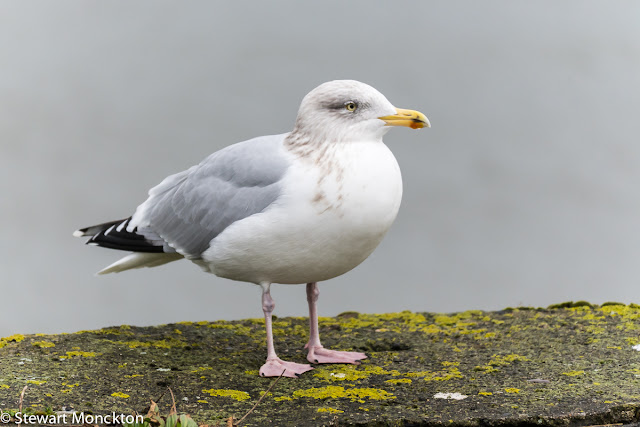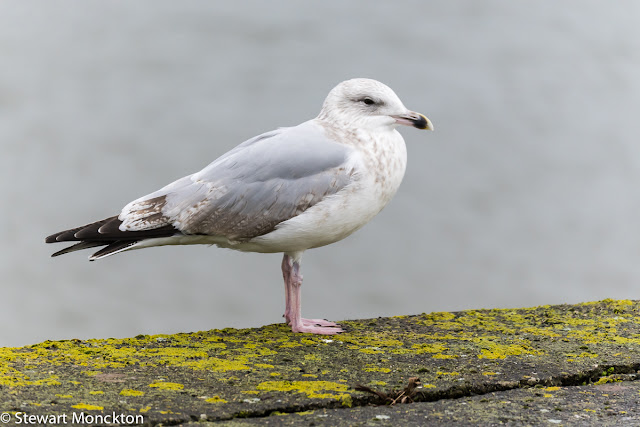The Herring Gull (Larus argentatus) is in many ways the default gull for much of Europe. Its almost laughing call is so over used in 'sea side sound scapes' as to become a cliche!
As you can see from these pictures, as they mature their plumage undergoes many changes, which is what makes gull so interesting I suppose. Many people (although not me!) seem to take huge delight in being able to identify the specific age of gulls based on their (the gulls!) plumage. Its all a bit much for me!
The gulls on the concrete wharf were taken around Maryport on the coast of Cumbria in the UK. The gull in the sunlight was from outside the Opera House in Oslo. This bird has a been seen at this location many times - I reported its band number and found out!
For all the amazing animals we have in Australia, we really only have 3 species of gull and (?) 90% of those are Silver Gulls, so it was nice to see a few more species in Europe.
As you can see from these pictures, as they mature their plumage undergoes many changes, which is what makes gull so interesting I suppose. Many people (although not me!) seem to take huge delight in being able to identify the specific age of gulls based on their (the gulls!) plumage. Its all a bit much for me!
The gulls on the concrete wharf were taken around Maryport on the coast of Cumbria in the UK. The gull in the sunlight was from outside the Opera House in Oslo. This bird has a been seen at this location many times - I reported its band number and found out!
For all the amazing animals we have in Australia, we really only have 3 species of gull and (?) 90% of those are Silver Gulls, so it was nice to see a few more species in Europe.
As ever, you can join in with WBW by clicking on the link below - and also as ever, please feel free to share WBW with other bloggers. SM






Hari OM
ReplyDeleteOne of my favourite pastimes (given the numbers of them around here!) The top four images, in my estimation, portray a juvenile in mid to late third-year plumage... (Blame David, who reviewed Gulls Of The World by Klaus Malling Olsen a while back and I couldn't resist its purchase!!!)Then there is the full-fledged adult modelling for its adoring audience! YAM xx
How neat you could find out more about the gull from its band number.
ReplyDeleteI do dabble in aging gulls, Stewart, but I must confess that it is akin to an exercise in masochism. I wonder that clinical therapists are not dealing with people suffering from "Subadult gull plumage syndrome!"
ReplyDeleteGreat Gull pics..I'm not a fan of Gulls and it's not there fault..Spending summers at the beach...too many people feed them and they become a true nuisance...Even out door restaurants are hazardous..I'm with you as far as following their ages by plumage..How old do they get?? Enjoy the rest of your week..
ReplyDeleteGood post, Stewart. Thanks.
ReplyDeleteBeautiful photos! I like seeing the different phases.
ReplyDeleteUnfortunately, the gulls are struggling to find food and many species are threatened with extinction here in Norway.
ReplyDeleteNice sequence! We have disagreements over the age of Bald Eagles. Part of the confusion is how to designate the plumage year-- They usually attain full adult plumage at about age 4 years, which is the start of their 5th year plumage. Then there is the biologic bell curve and even the hatch date to further confound the neat classification.
ReplyDeleteI think in their summer plumage they are a lovely gull although noisy.
ReplyDeleteThanks for hosting and have a good week ahead.
I find it difficult enough to identify many of the UK species of gull, Stewart, let alone age them!
ReplyDeleteNow this is a gull I know well:)
ReplyDeleteI seldom ever see a gull at all and then I cannot usually identify them! Nice set of photos and good you got the ring number. Cheers Diane
ReplyDeleteSeagulls can be so curious birds, sometimes...
ReplyDeleteAll the best, Stewart.
People under-appreciate the beauty of gulls! Lovely shots.
ReplyDeleteGreat photos!
ReplyDeleteWe have Herring Gulls here in the USA, too, Larus argentatus smithsonianus.
Have a wonderful day!
Love the sound of gulls along the shoreline.
ReplyDeleteExcellent ! A bird I'm used to seeing every day. They're very familiar.
ReplyDeleteFrienship
Nice series of photos and informative.
ReplyDeleteBeautiful photos of the gulls Stewart,the one with the rings has hungry I think. Greetings Caroine
ReplyDeleteTo prawda. To bardzo popularna mewa w Europie. Bardziej popularna jest tylko mewa śmieszka!
ReplyDeletePiękne zdjęcia!